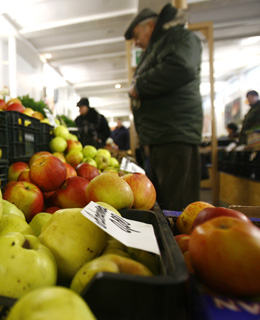
Sales time
To make money following the collapse of their incomes, farmers in the Latvian capital Riga sell their wares directly to the public
The first, tentative signs of economic recovery are starting to appear in Germany and France. In Poland, too — buoyed by strong domestic demand — the economy grew in the second quarter. All this raises hopes that, one year on, the worst of Europe's gut-wrenching recession may be nearing its end. Yet there's still one corner of the continent where the idea of a return to growth remains a distant dream: in the Baltic republics of Lithuania, Latvia and Estonia.
The three tiny states broke away from the crumbling Soviet Union almost two decades ago, and for much of the interim, they have served as poster children for the successful transition from communist state planning to free-market capitalism. Their soaring economies — between 2001 and 2008, growth ranged between about 7% and 10% a year — were bolstered by the three states' accession to the European Union in 2004. Their people are a lot better off: based on purchasing power, the per capita GDP in all three republics has about quadrupled over the past two decades. But even before the Lehman debacle, all three economies were showing worrying signs of overheating, fueled in part by real estate speculation and heavy borrowing abroad.
Those bubbles popped a year ago. Lithuania's economy contracted by a jaw-dropping 20% in the second quarter of this year — one of the worst performances in the world — after a 13% decline in the first quarter. Latvia (-20%) and Estonia (-17%) weren't far behind. In all three countries, exports are way down, unemployment is soaring and government budgets have swung sharply into the red. Latvia is in the worst mess. It received a $2.4 billion bailout from the International Monetary Fund last December, but that wasn't enough to shore up its shaky finances; in late August, the IMF formally agreed to another emergency lifeline of $278 million.
While each republic has its own specific problems, all three have reacted with a stout defense of their currencies accompanied by massive cuts in public spending. The pain has been enormous. Health care, education and other social spending were among the first items slashed. At one hospital in Riga, the Latvian capital, patients arriving for treatment outside set working hours are now being turned away, even at the emergency department. "We will be the villains, even though this is not our fault," says Andrejs Pavars, chairman of the hospital's board. Domestic consumer spending has collapsed. New car registrations in the region are down by as much as 80% this year.
Lithuanian President Dalia Grybauskaite, whose English is otherwise impeccable, talks about the economy's "downfall" when referring to the downturn, and that lapse speaks volumes: the onetime highfliers have been humbled. In an interview with TIME, Grybauskaite says 2010 will continue to be "difficult," with recovery coming at the earliest in 2011. The only good news — if you can call it that — is that "this year we'll probably hit bottom."